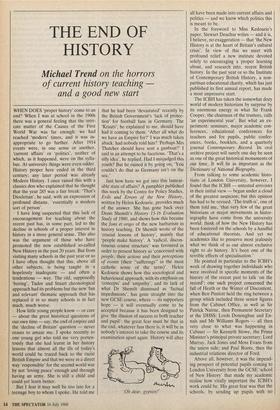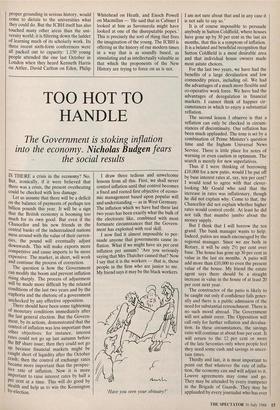THE END OF HISTORY
Michael Trend on the horrors
of current history teaching and a good new start
WHEN DOES 'proper history' come to an end? When I was at school in the 1960s there was a general feeling that the intri- cate matter of the Causes of the First World War was far enough: we had reached 'modern' times, and it was in- appropriate to go further. After 1914 events were, in one sense or another, 'current affairs' or 'politics', neither of which, as it happened, were on the sylla- bus. At university things were even odder. History proper here ended in the third century; any later period was already Modern History. I once raised this with a classics don who explained that he thought that the year 285 was a fair break: 'That's Diocletian', he said, with an expression of profound distaste, 'essentially a modern sort of person'.
I have long suspected that this lack of encouragement for teaching about the recent past has, in some part, led to the decline in schools of a proper interest in history in a more general sense. This also was the argument of those who have promoted the now established so-called New History in the past 20 years. But from visiting many schools in the past year or so I have often thought that this, above all other subjects, is being taught in a hopelessly inadequate — and often a tendentious — way. The old, supposedly 'boring', Tudor and Stuart chronological approach had its problems but the new 'fun and relevant' thematic approach that has replaced it in so many schools is in fact much, much worse.
How little young people know — or care — about the great historical questions of our own time — say, the end of empire and the 'decline of Britain' question — never ceases to amaze me. I spoke recently to one young girl who told me very porten- tously that she had learnt in her history lessons that almost all the ills of today's world could be traced back to the racist British Empire and that we were in a direct way 'responsible' for the second world war by not 'loving peace' enough and through having an army. She is still a child and could yet learn better.
But I fear it may well be too late for a teenage boy to whom I spoke. He told me that he had been 'devastated' recently by the British Government's 'lack of protec- tion' for football fans in Germany. The 'Krauts', he explained to me, should have had it coming to them. 'After all what do we have an Empire for?' I was much taken aback: had nobody told him? 'Perhaps Mrs Thatcher should have sent a gunboat?' I said in an attempt to be facetious. 'That's a silly idea', he replied. Had I misjudged this youth? But he ruined it by going on, 'You couldn't do that as Germany isn't on the sea.'
Just how have we got into this lament- able state of affairs? A pamphlet published this week by the Centre for Policy Studies, Evils and Errors of the New History, written by Helen Kedourie, provides much of the answer. She has gone back over Denis Shemilt's History 13-16 Evaluation Study of 1980, and shows how this became the fons et origo of the new barbarism in history teaching. Dr Shemilt wrote of the 'crucial lessons of history', mainly that 'people make history'. A 'radical, discon- tinuous course structure' was favoured in order to present history as 'concerned with people, their actions and their perceptions of events (their "sufferings" in the most catholic sense of the term)'. Helen Kedourie shows how this sociological and behavioural approach, with its emphasis on 'concepts' and 'empathy', and its lack of what Dr Shemilt dismissed as 'factual impediments', has gone straight into the new GCSE course, where — its supporters hope — it will eventually come to be accepted because it has been designed to give 'the illusion of success to both teacher and pupil': the great fear must be that in the end, whatever fuss there is, it will be in nobody's interest to take the course and its examination apart again. History will after 'Oh dear, gypsies!' all have been made into current affairs and politics — and we know which politics this is meant to be.
In the foreword to Miss Kedourie's paper, Stewart Deuchar writes — and it is, I believe, no exaggeration — that 'the New History is at the heart of Britain's cultural crisis'. In view of this we meet with profound relief a new institute devoted solely to encouraging a proper learning about, and research into, recent British history. In the past year or so the Institute of Contemporary British History, a non- partisan educational charity, which has just published its first annual report, has made a most impressive start.
The ICBH has taken the somewhat dozy world of modern historians by surprise by its enormous energy in what Sir Frank Cooper, the chairman of the trustees, calls 'an experimental year'. But what an ex- periment: seminars, major academic con- ferences, educational conferences for teachers and for pupils, public confer- ences, books, booklets, and a quarterly journal Contemporary Record. Its oral archive project will surely one day be seen as one of the great historical monuments of our time. It will be as important as the Dictionary of National Biography.
From talking to some academic histo- rians at London University, however, I found that the ICBH — untested arrivistes in their initial view — began under a cloud of the greatest suspicion; but this opinion has had to be revised. 'The truth is', one of them told me, 'that very few of the great historians or major movements in histor- iography have come from the university world; think of how the New History has been foistered on the schools by a handful of educational theorists. And yet we academics like to preserve most jealously what we think of as our almost exclusive right to do history. It's been one of the terrible effects of specialisation.'
He pointed in particular to the ICBH's work of drawing together individuals who were involved in specific moments of the history of the recent past to talk 'on the record': one such project concerned the fall of Heath or the Winter of Discontent, when Ben Pimlott held the ring between a group which included three senior figures from the Cabinet Office, as well as Sir Patrick Nairne, then Permanent Secretary at the DHSS; Lords Donoughue and En- nals and Mr Williams Rogers — all then very close to what was happening in Cabinet — Sir Kenneth Stowe, the Prime Minister's principal private secretary; Lord Murray, Jack Jones and Moss Evans from the union side; and Paul Roots, then the industrial relations director of Ford.
Above all, however, it was the impend- ing prospect of potential pupils coming to London University from the GCSE 'school of New History' that made my academic realise how vitally important the ICBH's work could be. His great fear was that the schools, by sending up pupils with no proper grounding in serious history, would come to dictate to the universities what they could do. But the ICBH itself has also touched many other areas than the uni- versity world; it is filtering down the ladder of learning much of its scholarly work. Its three recent sixth-form conferences were all packed out to capacity: 1,150 young people attended the one last October in London when they heard Kenneth Harris on Attlee, David Carlton on Eden, Philip Whitehead on Heath, and Enoch Powell on Macmillan — 'He said that in Cabinet I looked at him as Savonarola might have looked at one of the disreputable popes.' This is precisely the sort of thing that fires the imagination of the young. The ICBH is offering us the history of our modern times in a way that is as soundly based, as stimulating and as intellectually valuable as that which the proponents of the New History are trying to force on us is not.



















































 Previous page
Previous page